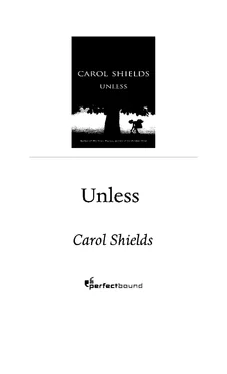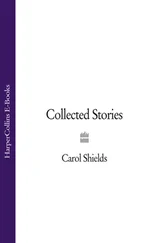Carol Shields - Unless
Здесь есть возможность читать онлайн «Carol Shields - Unless» — ознакомительный отрывок электронной книги совершенно бесплатно, а после прочтения отрывка купить полную версию. В некоторых случаях можно слушать аудио, скачать через торрент в формате fb2 и присутствует краткое содержание. Жанр: Современная проза, на английском языке. Описание произведения, (предисловие) а так же отзывы посетителей доступны на портале библиотеки ЛибКат.
- Название:Unless
- Автор:
- Жанр:
- Год:неизвестен
- ISBN:нет данных
- Рейтинг книги:4 / 5. Голосов: 1
-
Избранное:Добавить в избранное
- Отзывы:
-
Ваша оценка:
- 80
- 1
- 2
- 3
- 4
- 5
Unless: краткое содержание, описание и аннотация
Предлагаем к чтению аннотацию, описание, краткое содержание или предисловие (зависит от того, что написал сам автор книги «Unless»). Если вы не нашли необходимую информацию о книге — напишите в комментариях, мы постараемся отыскать её.
Unless — читать онлайн ознакомительный отрывок
Ниже представлен текст книги, разбитый по страницам. Система сохранения места последней прочитанной страницы, позволяет с удобством читать онлайн бесплатно книгу «Unless», без необходимости каждый раз заново искать на чём Вы остановились. Поставьте закладку, и сможете в любой момент перейти на страницу, на которой закончили чтение.
Интервал:
Закладка:
“I’m so glad you feel that way —”
“I’m actually phoning you from the office. Mr. Scribano would do somersaults in his grave if he knew the Christmas holiday had been abused, but I had to come in and look up the reviews for My Thyme Is Up. I suppose I could have looked them up on the Internet, but I wanted to feel the weight of them in my hand. And to listen, actually listen, to what the reviewers said at the time. I am quite sure, Reta, that you have read some of them yourself.”
“All of them, I think.”
“Excellent, excellent. I have never found myself in accord with those writers who refuse to read their own reviews. And heed their reviews. It seems to me a more than arrogant position to take. Even though facing the critics is sometimes painful, it is only good sense to know whether or not you have actually connected with the reader. And at what level. And this is what I am anxious to talk to you about, Reta. The level, the tone, the intention of the book.”
“Well, my —”
“And so I’ve read all the reviews now for your first novel. New York Times, Washington Post, et cetera. You had excellent coverage for a first novel, I feel. Truly, I mean it, excellent coverage.”
“Yes, I was surprised at all —”
“I have them here spread out on my desk, and I’ve been sitting here for an hour underlining and circling, and here is the question I have for you, Reta. How did you feel about the book’s reception?”
“I was pleased. Astonished, really.”
“Good. You feel, then, that the book’s intention was understood by the critical reader?”
“I. . I think so. Yes.”
“What, then, is your intention with this second novel, Thyme in Bloom ?”
“You mean, what am I aiming for?”
“Exactly.”
“Well, it’s a sequel. So I suppose my intention, as you call it, is much the same. The same people, the same setting in Wychwood, the continuing problem of —”
“The problem is, Reta, you are writing, now, a pilgrimage. I have always been deeply drawn to the idea of pilgrimage. Always. You have written — and I have not forgotten it is a draft — you have produced a novel about human yearning. Do you know how rare that is?
Your previous novel was — and I hope you will forgive me for putting it this way — it was a light romantic comedy about quite ordinary people.”
“I remember one of the reviewers called me a bard of the banal. And this was in an otherwise quite nice review. We really laughed about that.”
“Yes, yes, true. You do see, don’t you, Reta, that there is a problem about presenting your new novel as a sequel.”
“But it is a sequel. There’s Alicia and Roman and their marriage plans and —”
“Anyway, I’m phoning to see when you can get to New York. Next week if possible.”
“Oh! I can’t possibly do that, go to New York.”
“It’s terribly important that we talk now, the two of us. Before you finish your draft, before you go any further.”
“I’m afraid I can’t leave home at the moment, Arthur. There are family considerations that
—”
“I do remember Mr. Scribano saying there were problems, a worrying daughter, but surely you could get away for a day or two.”
“No. It’s not possible.”
“Then I’ll come to you! To Orangetown. Is this place near Montreal? I know Montreal very, very well.”
“It’s near Toronto.”
“Ah. Toronto, yes. I can easily manage Toronto. I’ll get a cab from there to your place of residence.”
“You might want to rent a car.”
“It will take us at least two days, Reta, to go through the manuscript. Is there a hotel in the village of Orangetown?”
“There’s the Orangetown Inn. It’s quite —”
“I’m looking at my calendar, I’ve got it right in front of me. Will January second be all right?”
“Let’s see, is that a Monday? I’ve got the days all mixed up, you know what Christmas week is like. If it’s a Tuesday or Wednesday I can’t possibly —”
“January second. I’ll get the earliest plane available. The Orangetown Inn. Don’t worry, I’ll phone right away and book for two nights, the second and the third. Keep them clear.
There’s so much to talk about.”
“Are you sure we need —?”
“This is actually an excellent idea, getting away from New York into the countryside, much more profitable in every way. Tranquility, tran-quil-i-ty. And if I may say so, meeting like this is a splendid way to launch the new year. Happy New Year, Reta.”
“Happy New Year. To you. Arthur? Hello? Are you there?”
Any
December 31, 2000
Dear Emily Helt:
For obvious reasons I am not a regular reader of the Chicago Tribune, but my New York editor (Scribano & Lawrence) has sent me a book review he picked up on the Internet, your long critique of Susan Bright’s An Imperfect Affair, a novel which I confess I have not read.
He was delighted to see that in your introduction you had mentioned me by name, believing, I suppose, that all publicity is good publicity. One does hear that quite often, and perhaps it’s true.
Women writers, you say, are the miniaturists of fiction, the embroiderers of fine “feeling.”
Rather than taking a broad canvas of society as Don DeLillo does, or Philip Roth, who interprets relationships through the “lens of sexual yearning,” women writers such as — and here you list a number of female names including my own — find universal verities in “small individual lives.” This, you go on to say, is a “tricky proposition,” which only occasionally works.
I surrender to your judgment about my own novel, My Thyme Is Up. It was a quick write and a quick read, with no broad canvas in sight and only a gesture toward erotic desire. Okay, okay. I am not offended in the least. I try to be objective about particular disregard; it is only casual disregard that is making me — shall I say it? — that is making me crazy, though no one, not even my family and close friends, suspects. Way back in high school we learned that the major themes of literature were birth, love, understanding, work, loneliness, connection, and death. We believed that the readers of novels were themselves “small individual lives,” and so were the writers. They did not suffer, as you intimate, from a lack of range in their subject matter. These lives apprehended the wide world in which they swam, and from their writers’ chairs they thrummed to the tune of sexual longing, but their gaze was primarily on the locked-up consciousness of their individual, human, creaturely being and how each separate person makes sense of all that is benevolent or malicious. There weren’t any rules about good and evil, and no Big Rule. It just seems that our species is happier when we are good. This is observable, though difficult to document.
It happens that I am the mother of a nineteen-year-old daughter who has been driven from the world by the suggestion that she is doomed to miniaturism. Her strategy is self-sacrifice. I know what that feels like. She can have “goodness but not greatness,” to quote the well-known Dr. Danielle Westerman. It is, as you say, a “tricky proposition.” And she has been tricked.
Yours, Xeta d’Orange
Whether
Danielle Westerman has absorbed, to the greatest degree possible for her, to the greatest degree bearable for her, the paradox of subjugation. She’s probably come to the place where she knows this is as good as it’s ever going to be. She hasn’t the strength for yet another bout of resistance, but she’s not going to surrender either. She refuses, for instance, to embrace the goddesses of old. There were never any such goddesses, she says: only appeasement, divagation, crumbs.
Читать дальшеИнтервал:
Закладка:
Похожие книги на «Unless»
Представляем Вашему вниманию похожие книги на «Unless» списком для выбора. Мы отобрали схожую по названию и смыслу литературу в надежде предоставить читателям больше вариантов отыскать новые, интересные, ещё непрочитанные произведения.
Обсуждение, отзывы о книге «Unless» и просто собственные мнения читателей. Оставьте ваши комментарии, напишите, что Вы думаете о произведении, его смысле или главных героях. Укажите что конкретно понравилось, а что нет, и почему Вы так считаете.












